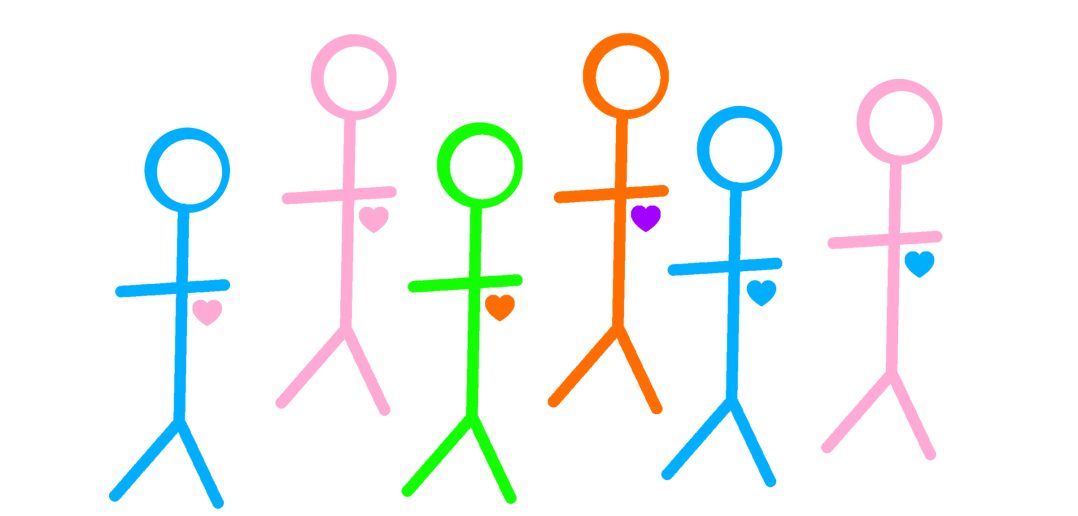Are you a boy or a girl or is it just a matter of generation and choice?
By Dorothy Dobbie
When my daughter Shauna was three, she overheard me talking to a friend about our dilemma over choosing her name. We didn’t know then, pre-birth, whether it was a boy or a girl, so we settled on Sean/Shauna to make a quick pivot no matter what happened.
Shauna was a wise little thing and looked at my friend and I with a mixture of childish disdain and incredulity, finally piping up, “Why didn’t you just look at my bum!?”
Well, that was the old days. And apparently such simple conclusions can no longer be drawn according to the prevailing school of thought. Your genitalia apparently have little to do with the real case – at least in the minds of some modern theorists who feel it is a matter of how you “feel” or perceive yourself.
Now that sounds very egalitarian and sensitive, doesn’t it? But is it?
As a kid, my mother characterized my sister as a “tomboy” and me as . . .
I am not sure what – I was the bookish one. But my “tomboy” sister grew into a quintessential lady, very conscious of her female identity, whereas I was the one who liked going to wrestling matches and toting a 22 rifle along with my dad on a “hunting” trip (we never actually shot anything).
We not only change as we grow up, but our essential sense of identity can be coloured by the attitude of people around us. If we are constantly reminded that we can “choose” whether we are male or female, it is not hard to understand how this can be very confusing as we enter puberty, a time of total confusion for many.
I was one of those, not about my sexual identity – I had a solid grasp on that – but who I “was”. I recall long internal dialogues at 13 or 14 about who was the real me – the one I thought I knew or some emerging character who was leading my ideas in wider directions. We don’t talk about these things, but I am pretty sure that with some probing a similar story could be found in most humans. Nor is this unexpected considering the hormonal storm taking place internally at that age.
Prepubescence is the period in a young person’s life when these sorts of questions emerge most forcefully. Therefore, it is not hard to see why, given the current narrative, some kids end up thinking their gender was mistakenly assigned. Unfortunately, this is sometimes sadly interpreted by well-meaning but misdirected adults as a green light to action including the prescription of puberty delaying drugs such as progesterone (it causes cancer). Worse, some kids have been counselled to have a medical alteration of their genitals, an irreversible procedure. “But we wait till they are 18,” protest the proponents. Huh! Kids today at 18 are still babies and there are documented cases of youngsters who have taken that step only to realize their mistake a few years later. Some end up taking their own lives.
So, what has all this to do with using so-called gender-neutral pronouns such as “they” when a child demands it? Sadly, it promotes the myth of gender “fluidity”, an expression of some extremists who have terminal gender confusion.
While, psychologically, someone can be convinced they are either male or female at will, in 98.3% of the cases that is not physically true. Yes, a small percentage – 1.7 per cent– are born with “intersex traits”, meaning they have reproductive organs, hormonal patterns and/or chromosomal patterns that do not fit the typical anatomy of male or female bodies. Even fewer have biologically identifiable sexual variations where chromosomal deviations do not match up with genitalia. These folks deserve every consideration. But this is a very small proportion of the population.
Gender dysphoria, genuine confusion over gender identity, is another matter. It occurs a bit more frequently, the numbers depending on the reporter. Even at this, only 59,460 Canadians self-identified as “transgender” in 2022. Another 41,355 identified as “non-binary”. Even added together, these are pretty small potatoes.
This leads back to the essential question: should we respect the demand to honour pronouns claims?
If you feel you should, go ahead. I guess I would too if I thought not doing so would hurt another person’s feelings.
But as a parent, I would refer to my daughter’s wise counsel so very long ago and advise them to do exactly what she did.
Seriously, though, you could take the child to a specialist for clinical analysis of their biological reality and go on from there. If there are biological causes, they are often detected in teenagers.
And at the end of the day, this current trend will undoubtedly fade away in a few years. So, try not to get too annoyed by signatures ending in male or female pronouns.



